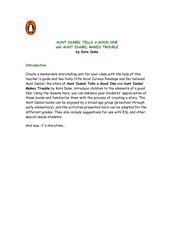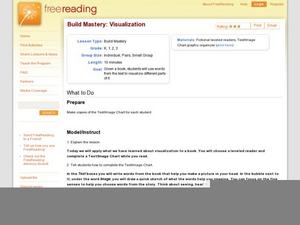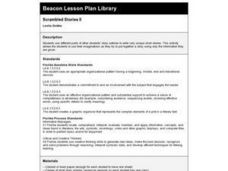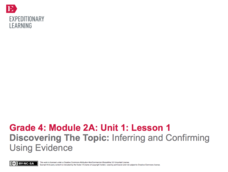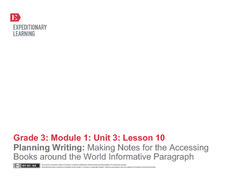Curated OER
Developing a Topic for Writing Using an Idea Web
Teach your upper graders how to use an idea web to develop a topic for writing. After reading a variety of stories about friendship (a list of stories with the theme of friendship is included), model using an idea web. Class members...
Curated OER
Aunt Isabel Tells a Good One...
Explore language arts by reading two similar stories in order to compare and contrast them in class. Young readers read two Aunt Isabel books, by Kate Duke, and discuss the main characters, plot, and setting. They complete a graphic...
Curated OER
Build Mastery: Visualization
What do you see? Young reader tap into the visualization process as they listen to or read a fiction story and fill out a graphic organizer. Model this first with a think-aloud, showing scholars how you visualize a familiar story. For...
Curated OER
Understanding and Using Root Words to Expand Vocabulary
Middle schoolers engage in a lesson which reminds them that root words indicate the base meaning of a word, and that those roots are found in many different words that have similar meanings. Pairs of pupils use construction paper and...
Curated OER
Impersonating Great Poets Using "Science Verse" by Jon Scieszka
A great way to bring poetry and parody into your language arts classroom, this lesson mimics famous poems based on Jon Scieszka's Science Verse. The activity not only allows the class to see examples of poem parodies, but to create their...
Curated OER
Maus: After Reading Strategy Instructional Routine
Class members create literary mandalas for two characters from Maus, Art Spiegelman’s graphic novel about his father’s experiences with the Holocaust. After finding quotes that reveal three good traits and three bad traits of each...
Curated OER
A PICTURE IS WORTH A THOUSAND WORDS
Students compare and contrast characters from various texts and compile the collected data into several graphic organizers.
Curated OER
Scrambled Stories II
Review story elements with your class. They will use examples from a story to develop critical-thinking questions. Then they use a graphic organizer to describe the setting, character, and plot of the story, focusing on how they...
Curated OER
Different Strokes For Different Folktales
Young readers use graphic organizers, such as Venn diagrams and story maps, to analyze a variety of folktales and the elements of a story. They use writing, sequencing activities, and creative art to identify the morals learned from a...
Curated OER
Researching African Americans Who Made a Difference
Celebrate Black History Month with this lesson, in which middle schoolers create an essay about a famous African-American. Writers conduct research online, take notes to write an essay in proper format, and use ideas, text, and graphics...
Curated OER
Introduction to Myths, Fables, and Legends
Middle schoolers identify elements of myths, fables, and legends as they read an example of each. After reading an example of each type of story, they list elements from each. They compare and contrast these features by...
Curated OER
Is Perception Reality? Writing Paradoxes in Poetry
Explore the paradox of the universe - or, at least, of popular music - with this instructional activity. Using the songs "Inaudible Melodies" by Jack Johnson and "She" by Green Day, your class will complete a graphic organizer to help...
Lawrence Virtual School
Context Clues
Considering a lesson on using context clues to figure out the meaning of unfamiliar words? This packet includes a brief reading passage about strategies readers can use and 12 very different graphic organizers, including a template for a...
Curated OER
Comprehension Instructional Routine: Sequence of Events in Text
If you're looking for a detailed instructional activity on event sequencing from informational text, you've found it. There is an entire script for you to draw from as you explore order of events and sequence words. Scaffolding is key...
Virginia Department of Education
Analyzing and Planning Persuasive Writing
Young writers work backward to analyze persuasive techniques. As a class, work through the provided persuasive letter: a plea to an imaginary city council to lift a city-wide ban on fast food restaurants and discount stores. Start by...
EngageNY
Discovering the Topic: Inferring and Confirming Using Evidence
Allow your class to figure out what they will be studying through an inquiry-based anticipatory set that involves analysis of mystery documents and practice with making inferences. The lesson plan document includes a detailed description...
EngageNY
Planning Writing: Making Notes for the Accessing Books Around the World Informative Paragraph
Encourage your young writers to thoughtfully plan and organize their work. First, model how this is done and vocalize your thought process as you work. Next, create a class list of strategies that they can use during independent writing...
Florida Center for Reading Research
Vocabulary: Word Meaning, Oh My Word!
Ever come across an unfamiliar word while reading and can't decipher its meaning? Use a worksheet and graphic organizer that tracks and helps bring meaning to unknown words as learners read a text. A worksheet and graphic organizer come...
Louisiana Department of Education
Out of the Dust
The Grapes of Wrath may be the most famous novel set during the Dust Bowl, but what other stories cover the same time? The unit focuses on the Karen Hesse novel Out of the Dust. Learners keep a timeline of the Dust Bowl, maintain a...
EngageNY
Writing a Summary: “Middle Ages” Excerpt 1
What's this all about? Scholars learn the importance of summarizing skills using a summary writing graphic organizer. They work with an elbow partner to discuss summaries and complete the organizer using Middle Ages Excerpt 1. Learners...
Curated OER
I'm a Changed Pig - Personal Narrative
Young writers explore character arcs, conflict, and narrative in this complete and ready-to-use lesson plan from Scholastic. As a class read The Three Little Wolves and the Big Bad Pig and discuss the dramatic change the pig...
Curated OER
Tell Me More
Fifth graders demonstrate research techniques in addition to endeavoring to display focus and stay on topic. Using books and stories, they gather, organize, and share information about a topic. Additionally, they explain to the class...
Curriculum Corner
Fill in the Missing Letters
Scholars show what they know about the alphabet with a fill-in-the-blank worksheet that's missing some of its letters.
Bulgarian Creative Writing Competition
Creative Writing Workshop
Looking for suggestions on how to organize a creating writing workshop? For topic suggestions appropriate for various grade levels? Check out a resource packet, designed for English language arts instructors, that is packed with ideas...
Other popular searches
- Art Graphic Design
- Graphic Artists
- Graphic Design Art Lessons
- Graphic Art Logos
- Digital Graphic Arts
- Graphic Art Safety
- Graphic Art Photoshop
- Graphic Arts Communication
- Graphic Arts Vocabulary
- Graphic Art Word Search
- Graphic Art Design
- Graphic Art Votech



